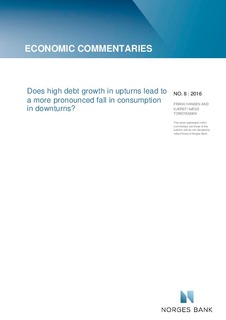Does High Debt Growth in Upturns Lead to a More Pronounced Fall in Consumption in Downturns?
Others
Published version
Permanent lenke
http://hdl.handle.net/11250/2558028Utgivelsesdato
2016Metadata
Vis full innførselSamlinger
Sammendrag
The strong accumulation of debt in the period preceding the financial crisis has resulted in a renewed focus on the relationship between debt and household demand in an economic downturn. Studies based on disaggregated data find empirical evidence that consumer demand from highly indebted households responds more strongly to changes in income and wealth compared with that of less indebted households. Glick and Lansing (2010) similarly show that the countries with the largest rise in debt prior to the financial crisis also experienced the strongest rise in real estate prices, and that those same countries experienced the strongest decline in consumption when house prices began to fall. In a study involving 14 OECD countries over the past 140 years, Jorda et al. (2013) find that the fall in GDP during recessions is more pronounced when the crisis is preceded by rapid debt accumulation. In this commentary, we analyse to what extent it is a systematic feature of recessions that strong household debt accumulation preceding a recession amplifies the decline in private consumption during the recession. Our method is similar to that of Jorda et al. (2013), using a panel of 64 recessions in 21 countries in the period between 1970 Q1 and 2014 Q4.

